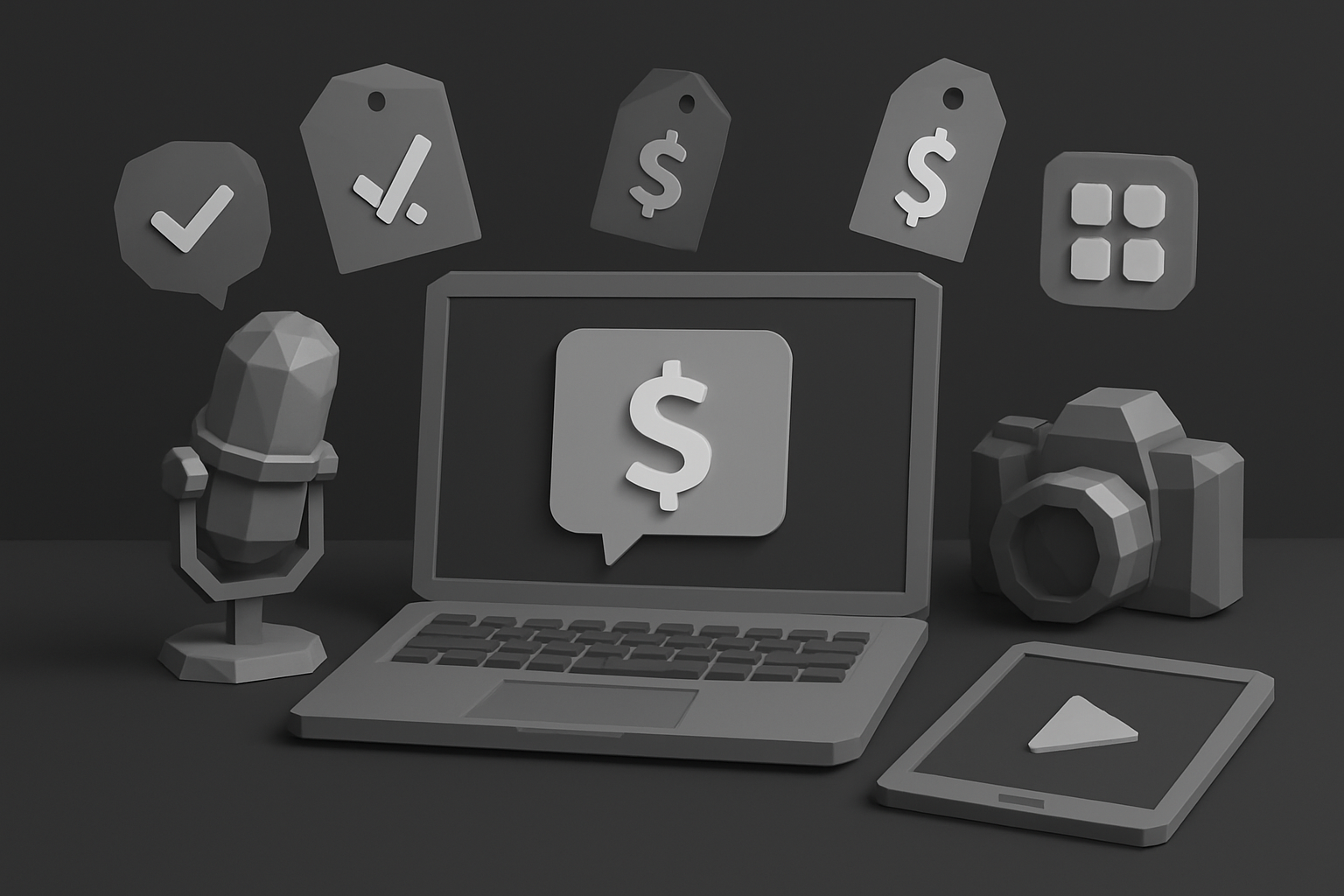Dreaming of more freedom, flexibility, and financial independence in 2025? You’re not alone. The rise of the lifestyle business is transforming how people work, travel, and live—by putting personal values and freedom at the forefront.
This article explores seven innovative lifestyle business ideas designed for the modern world. From digital products to consulting and content creation, these business models let you shape your work around your life—not the other way around.
With technology, remote work, and automation lowering the barriers, there’s never been a better time to create a business that offers location independence, passive income, and personal fulfillment. Ready to discover actionable ideas for your next chapter?
What is a Lifestyle Business?
A lifestyle business is designed with one core purpose—supporting the life you want to live. Rather than chasing rapid growth or investor funding, a lifestyle business puts your freedom, flexibility, and personal priorities front and center. If you’ve ever dreamed of working from a beach, spending more time with family, or pursuing passion projects, this business model might be your perfect fit.

Defining Lifestyle Businesses
A lifestyle business is built to serve you—not the other way around. The main goal is to create a sustainable income that enables your ideal lifestyle, whether that means working remotely, setting your own hours, or building a business around your passions.
Key features of a lifestyle business:
- Flexible work hours and location
- Low startup costs and overhead
- Scalable income streams
- Owner-driven decisions and priorities
Common examples include selling digital products, freelancing, online coaching, and content creation. Unlike traditional startups, which focus on aggressive scaling and attracting investors, a lifestyle business optimizes for work-life balance and steady, owner-controlled growth.
Here’s a quick comparison:
| Aspect | Lifestyle Business | Startup |
|---|---|---|
| Main goal | Personal freedom & income | Rapid growth & market capture |
| Growth strategy | Sustainable, owner-paced | Aggressive, investor-driven |
| Work structure | Flexible, remote-friendly | Often long hours, team-based |
| Income model | Scalable, steady | High-risk, high-reward |
Today, technology and remote work have made it easier than ever to start a lifestyle business. In fact, according to global freelance workforce statistics, more than 60% of freelancers now work remotely, highlighting the flexibility this path offers. Many lifestyle business owners also automate or outsource routine tasks, freeing up even more time for what matters most.
Why Choose a Lifestyle Business in 2025?
The appeal of a lifestyle business is only growing as we head into 2025. Recent trends show a rising demand for remote work, digital nomadism, and passive income streams. The pandemic accelerated a shift in work preferences, pushing more people to seek autonomy, flexibility, and meaningful work over traditional office jobs.
Technology is another game-changer. New tools make it simple to launch, automate, and scale a lifestyle business from anywhere in the world. You can now align your business with your unique skills, passions, and long-term goals—personalizing your work in ways that weren’t possible a decade ago.
Cultural influences, like Tim Ferriss’s “4-Hour Workweek,” have inspired a new generation of solopreneurs to design their own paths. The rise of the one-person business is proof that you don’t need a big team or massive funding to succeed. Instead, you need a clear vision of the life you want—and the willingness to build a lifestyle business that gets you there.
7 Lifestyle Business Ideas to Try in 2025
Are you ready to shape your future with a lifestyle business that fits your ideal life? The landscape for entrepreneurs is evolving fast—2025 promises even more freedom, flexibility, and income opportunities than ever before.
In this section, we’ll dive deep into seven innovative lifestyle business ideas. Each one is designed for maximum scalability, adaptability, and relevance to digital trends. Whether you want to monetize your skills, create passive income, or build an audience, there’s a model here for you.
Explore these options, get inspired, and discover which lifestyle business could transform your work and your life.

1. Create and Sell Digital Products
The digital product boom continues to redefine what a lifestyle business can look like. By creating assets like online courses, eBooks, templates, or design resources, you can build a business with high profit margins and almost no overhead.
Why is this model so attractive? Digital products are infinitely scalable. You make something once, then sell it over and over—often while you sleep. Platforms like Shopify, Gumroad, or your own website make launching a breeze. Plus, with automation tools, you can set up email marketing and sales funnels for recurring revenue.
Examples of digital products:
- Notion templates for productivity
- Lightroom presets for photographers
- Video tutorials or online courses
- Resume or business proposal templates
The e-learning market alone is projected to hit $375 billion by 2026. To get started, identify a niche where you have expertise, validate the demand, then build and launch your product. For a step-by-step approach, check out the Building Digital Products Guide.
A lifestyle business built on digital products means you can work from anywhere, automate sales, and enjoy true location independence.
2. Launch a Freelance or Consulting Business
If you have a skill—writing, design, marketing, coaching, or something niche—freelancing or consulting is a proven lifestyle business. This model lets you set your own hours, choose your clients, and work from anywhere in the world.
You can start small by building a portfolio and offering services on platforms like Upwork or LinkedIn. As you gain experience, niche down to command higher rates or productize your services for efficiency. Retainer agreements can create income stability, while subcontractors can help you scale.
Popular freelance services:
- Copywriting and content creation
- Business or marketing consulting
- Virtual assistance
- Web and graphic design
Did you know 77% of freelancers work on schedules that fit their lifestyle? This flexibility is a hallmark of a lifestyle business. For more insights on freelance earnings and trends, you can explore Upwork’s latest statistics.
Tips for success: Automate client onboarding, use contracts, and always prioritize clear communication. Over time, you’ll build a lifestyle business that supports both your financial and personal goals.
3. Become a Content Creator or Influencer
Content creation is more than just a trend—it’s a dynamic lifestyle business model that’s here to stay. By building an audience on YouTube, Instagram, TikTok, or Substack, you can monetize through ads, sponsorships, affiliate marketing, and your own digital products.
Diverse revenue streams include:
- Sponsored posts and brand collaborations
- Affiliate partnerships
- Selling exclusive content or memberships
- Launching your own digital products or courses
Micro-influencers are especially in demand, as brands value smaller but highly engaged communities. For example, a makeup artist sharing tutorials, a travel vlogger documenting new destinations, or a fitness coach offering virtual classes—all can build thriving lifestyle businesses.
According to recent research, 57% of young Americans would like to become influencers. The key? Choose a niche you love, deliver consistent value, and use tools to automate posting and track engagement.
A content-driven lifestyle business gives you the freedom to express yourself, connect with others, and generate income on your own terms.
4. Build a Membership or Subscription Community
Membership and subscription communities are rapidly gaining traction as a sustainable lifestyle business model. By offering exclusive content, resources, or networking opportunities, you can build a loyal customer base and enjoy predictable recurring revenue.
Popular platforms: Patreon, Memberstack, Circle, and even your own website.
Membership businesses come in many forms:
- Online learning communities for specific skills
- Mastermind groups for entrepreneurs
- Niche forums offering premium insights
- Exclusive resource libraries
This lifestyle business model thrives on engagement. Regularly update your content, interact with members, and offer tiered pricing to accommodate different needs. The global membership economy is growing as consumers shift from ownership to access.
To succeed, define your unique value proposition and market your community to your audience. With the right approach, a membership-based lifestyle business can deliver both financial stability and meaningful connections.
5. Start an Ecommerce Business with Dropshipping or Print-on-Demand
Ecommerce remains a powerful lifestyle business option—especially with dropshipping and print-on-demand. These models allow you to sell physical products without managing inventory or shipping logistics.
How does it work? You set up an online store using platforms like Shopify, Printful, or Oberlo. When a customer places an order, your supplier ships the product directly to them. This keeps overhead low and allows you to focus on branding and customer experience.
Examples:
- Custom t-shirts or mugs with unique designs
- Niche accessories for hobbies or fandoms
- Print-on-demand artwork or planners
Ecommerce sales are rising globally, with dropshipping projected to reach $476 billion by 2026. The key to a successful lifestyle business in this space? Choose a specific niche, prioritize customer service, and use automation apps to streamline fulfillment.
With minimal upfront investment, you can build a lifestyle business that gives you the flexibility to operate from anywhere.
6. Develop a SaaS or Indie App
Software as a Service (SaaS) or indie app development offers one of the most scalable lifestyle business models. By creating a tool that solves a real problem, you can generate recurring revenue through subscriptions.
Examples include:
- Productivity tools for remote workers
- Personal finance or budgeting apps
- Niche platforms for specific industries
Thanks to low-code and no-code tools, barriers to entry are lower than ever. Start by validating your idea, then build a minimum viable product (MVP) and market to early adopters. Offer a free trial to attract users, and use their feedback to iterate quickly.
Monetization strategies often center on subscription models, tiered pricing, or a freemium approach. The SaaS market continues to expand, making this a future-proof lifestyle business for tech-savvy entrepreneurs.
A SaaS-based lifestyle business allows you to automate much of your operation, freeing you to focus on growth or even other ventures.
7. Teach Online or Offer Coaching
The demand for online education and coaching is exploding, making it a perfect lifestyle business for those with expertise to share. You can teach through recorded courses, host live group sessions, or offer one-on-one mentorship.
Popular platforms: Teachable, Thinkific, and Zoom for interactive classes.
Examples:
- Language tutors helping students worldwide
- Business coaches guiding startups
- Wellness instructors leading virtual classes
This lifestyle business is highly flexible—you set your own schedule, teach from anywhere, and scale by recording content for passive income. Upsell digital products, memberships, or workshops to increase your earning potential.
Build your personal brand, showcase testimonials, and develop a unique teaching style. With the right approach, teaching or coaching online can be a deeply rewarding lifestyle business that grows with you.
How Much Does It Cost to Start a Lifestyle Business?
Wondering how much it really takes to launch a lifestyle business? The good news: starting your own venture in 2025 is more affordable than ever, thanks to technology and the rise of digital tools. Many lifestyle business owners begin with minimal upfront investment, making it possible to test ideas and scale at your own pace.

Typical Startup Expenses
You don’t need a massive budget to get your lifestyle business off the ground. Here are the most common startup expenses for digital solopreneurs:
- Domain registration and web hosting
- Basic equipment (laptop, microphone, camera)
- Software subscriptions (design, accounting, automation)
- Marketing tools (email, social media schedulers)
For many, a simple setup is all you need to launch. For example, software subscriptions often start as low as $10–$30 per month, and basic web hosting can be found for $5–$15 monthly.
Cost Comparison Table
| Lifestyle Business Model | Typical Startup Cost | Ongoing Monthly Cost |
|---|---|---|
| Digital Products | $100–$500 | $20–$100 |
| Freelancing/Consulting | $50–$300 | $10–$50 |
| Content Creation/Influencer | $200–$800 | $30–$150 |
| Dropshipping/Print-on-Demand | $200–$750 | $30–$100 |
| SaaS/Indie App | $500–$5,000+ | $50–$500 |
| Online Coaching/Teaching | $100–$600 | $20–$80 |
These numbers reflect the flexibility of a lifestyle business—most models can be bootstrapped with minimal funds, especially when leveraging free or low-cost tools.
Real-World Example: Digital Product Startup
Starting a digital product-based lifestyle business can be surprisingly budget-friendly. Many creators launch with essentials like a domain, website builder, and a couple of key software tools—often for less than $500. If you want inspiration for what to sell, check out this list of Digital Products to Sell Online to see what’s possible.
Ongoing and Hidden Costs
As your lifestyle business grows, you’ll encounter recurring expenses:
- Marketing and advertising
- Outsourcing (virtual assistants, designers)
- Payment processing and transaction fees
- Premium software upgrades
These costs typically scale with your business, so you can reinvest profits as you grow. Dropshipping and print-on-demand models keep inventory risk low, while SaaS or app development may require higher upfront investment but can deliver scalable returns.
Tips to Keep Startup Costs Low
- Use free trials or freemium versions of essential tools.
- Start with basic equipment—upgrade as your income grows.
- Automate repetitive tasks to save time and reduce labor expenses.
- Bootstrap where possible, reinvesting early profits back into your lifestyle business.
Ultimately, launching a lifestyle business in 2025 is more accessible than ever. With careful planning and a lean approach, you can build a business that supports your ideal lifestyle without breaking the bank.
Key Steps to Launch Your Lifestyle Business in 2025
Ready to take the leap? Launching a lifestyle business in 2025 is simpler than ever, but success starts with a solid foundation. Here’s a step-by-step guide to get you moving from idea to income.

Identify Your Skills and Passions
Start with a self-assessment. List your top strengths, experiences, and interests—these are the building blocks of your lifestyle business.
- Reflect on what excites you.
- Identify skills others seek.
- Look for overlap between your passions and market demand.
Research trends and competitor offerings to validate your idea before moving forward.
Choose the Right Business Model
Select a lifestyle business model that matches your personal goals. Consider how much flexibility, automation, and scalability you want.
- Digital products, consulting, and content creation are popular options.
- Think about recurring revenue and passive income.
- Explore the Create Once, Sell Forever Model for inspiration on building scalable digital assets.
Align your choice with what energizes you and fits your desired lifestyle.
Set Up Essential Tools and Systems
Equip yourself with the right digital tools to operate efficiently.
- Register your domain and set up basic web hosting.
- Choose platforms for sales, email marketing, and project management.
- Build a simple website or landing page to showcase your lifestyle business.
Start lean—upgrade your stack as you grow.
Build and Engage Your Audience
No lifestyle business thrives without an audience.
- Use content marketing: start a blog, YouTube channel, or newsletter.
- Engage on social media platforms where your target market hangs out.
- Collect emails to nurture leads and build trust over time.
Showcase your expertise and offer consistent value.
Automate and Outsource to Scale
As your lifestyle business grows, automation is key to maintaining freedom.
- Set up automated sales funnels and email sequences.
- Outsource non-core tasks to virtual assistants or freelancers.
- Focus on activities that drive results and align with your strengths.
This approach helps you maintain flexibility and avoid burnout.
Track Progress and Iterate
Monitor your lifestyle business using analytics tools.
- Set clear goals and KPIs.
- Adjust your strategies based on what the data tells you.
- Stay agile—learn from feedback and iterate quickly.
Continuous improvement keeps you ahead of the curve.
Common Challenges and How to Overcome Them
Starting a lifestyle business in 2025 is exciting, but it’s not without hurdles. Whether you’re just launching or scaling up, certain challenges tend to crop up for nearly every entrepreneur.
Here are the most common obstacles and proven ways to overcome them:
Building an Audience:
Getting noticed can be tough when you’re new. Leverage existing platforms, collaborations, and content marketing to build credibility. Tap into social media or guest post on popular blogs to speed up your growth. According to Freelance earnings and market trends, the freelance and creator economy is expanding fast—now is the time to carve your niche.Maintaining Motivation and Discipline:
Working solo can sometimes drain your drive. Set clear, achievable goals and create daily routines. Using accountability partners or joining mastermind groups can keep your momentum strong.Managing Inconsistent Income:
Income can fluctuate, especially in the first year of a lifestyle business. Diversify your revenue streams and consider retainer or subscription-based models for more stability.Tech Overwhelm:
With so many tools out there, it’s easy to feel lost. Start simple—choose only the essentials, then scale up as your lifestyle business grows. Don’t hesitate to outsource technical work if it’s not your strength.Work-Life Boundaries:
It’s tempting to blur the lines between work and personal time. Design your schedule around your ideal lifestyle and stick to it to avoid burnout.
Many successful lifestyle business owners automate or outsource routine tasks, freeing up time for creativity and growth. Ultimately, aligning your business activities with your core values and desired lifestyle is the secret to long-term fulfillment.
Ready to turn your ideas into a real lifestyle business in 2025? You’ve just explored seven flexible ways to design work around your life, not the other way around. Whether you’re drawn to digital products, content creation, or something else, the next step is finding the right idea that matches your skills and passions. If you want a head start, I recommend checking out a curated list of proven lifestyle business opportunities—perfect for exploring what’s possible and sparking your creativity. Take the next step and View Product Ideas.